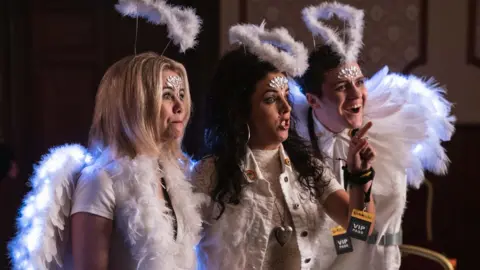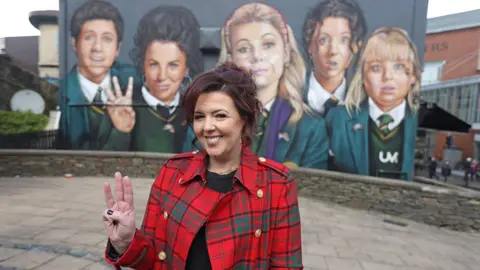Derry Girls finale hailed as 'a triumph' by critics
 Channel 4
Channel 4The finale of Derry Girls has been hailed as "a triumph" by critics.
The Channel 4 sitcom, about five high school students in the 1990s who must navigate their teenage years against the backdrop of the Troubles, concluded on Wednesday after three series.
Many critics awarded the finale five stars and praised the show's writer and creator Lisa McGee.
"The extended finale had it all," said The Telegraph's Anita Singh. "It was poignant, heartwarming and hilarious."
"It took the elements that have always made up the show - the Troubles and the growing pains of teenage friends - to a higher level. Never did I think hearing a Corrs song would reduce me to tears, but here we are."
Derry Girls, which first aired in 2018, stars Saoirse-Monica Jackson, Louisa Harland, Nicola Coughlan, Jamie-Lee O'Donnell and Dylan Llewellyn.
The last two episodes of the series, broadcast on consecutive nights this week, centred on Orla and Erin's joint 18th birthday party and the group's attempt to get tickets for Fatboy Slim's performance at Derry's Halloween Festival.
 Peter Marley
Peter MarleyBut the events of the finale take place against the backdrop of the Good Friday Agreement, which brought an end to a period of conflict in Northern Ireland known as the Troubles.
"It will have brought many viewers right back to 1998," wrote Brendan McDaid of the Derry Journal, "the signing of the Good Friday Agreement (as narrated by real-life journalist Donna Traynor) and the subsequent referendum which put the public seal of approval on a new dawn for the north of Ireland, with people north and south voting overwhelmingly in favour."
"The finale was packed with special moments," he added. "They have all done Derry proud."
Maureen Coleman of The Belfast Telegraph said: "This final instalment is a fabulous piece of work that had me howling with laughter one minute and weeping the next.
"McGee has made this ability to flip our emotions her calling card and she does it so well. It's a gift."
 PA Media
PA Media"Rather than resting on its laurels, it pushed itself to new heights," said The Guardian's Rebecca Nicholson, as she declared the finale "a triumph" in her five-star review.
"It took a while for Derry Girls to establish itself as that rare thing, a modern comedy classic, but now it feels like it has always been there. There's a strong sense that though it will be missed, it hasn't outstayed its welcome. Instead, it has been absolutely cracker."
In a four-star review, Metro's Rachael O'Connor said: "It's been an absolutely wild ride, with dazzling cameos, laugh-out-loud moments and devastating scenes, centred around the undercurrent of the Troubles.
"It was a serious feat to successfully set a sitcom to the backdrop of the horrors in Northern Ireland and struggle for peace, but creator Lisa McGee never put a foot wrong.
"The show has always been at its strongest when combining the insulated, selfish lives of teenagers and their personal dramas with the earth-shattering real-life atrocities of the time."
 Peter Marley
Peter MarleyO'Connor also praised an "absolutely breathtaking cameo" in the finale - which we won't spoil here.
McDaid agreed, writing in his Derry Journal review: "Arguably the biggest shock of the entire show was saved for the final moment, confirming Lisa McGee and the Derry Girls cast and crews' ability to make you laugh, cry and gasp in surprise all at the same time."
Allow X content?
"What a farewell," wrote Carol Midgley in The Times, also awarding the show's conclusion five stars. "Derry Girls bowed out for ever in a finale special that was funny, profound, sharp, political, sentimental and pretty much perfect.
"Practically every beat of Lisa McGee's comedy was exquisitely judged, balancing just the right amount of pathos with wit and a good dose of Uncle Colm, the world's most boring man, who feels like a Father Ted character."
She continued: "Derry Girls has been a well-observed, life-affirming ride but all good things must end. The final speech went to Erin who, after voting "yes" in the referendum despite her misgivings about the release of prisoners who had murdered, said: 'We have to move on; we have to grow up'. A nod to both the peace process and the Derry Girls simultaneously. I'm not ashamed to say I had a tear in my eye."
